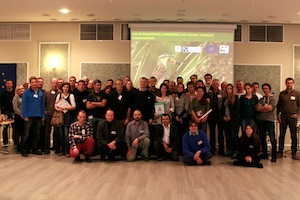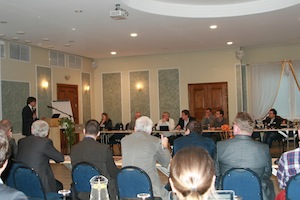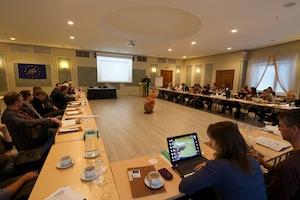International Conference on Aquatic Warbler Conservation
 An International Conference was held in Vilnius on the 14-15th of November, where more than 60 of the most famous Aquatic Warbler scientists, experts and environmentalists discussed the current conditions and security perspectives of this globally threatened bird.
An International Conference was held in Vilnius on the 14-15th of November, where more than 60 of the most famous Aquatic Warbler scientists, experts and environmentalists discussed the current conditions and security perspectives of this globally threatened bird.
Experts and scientists gathered from 12 countries to share their knowledge on Aquatic Warbler habitat management practices and scientific achievements. “Aquatic warbler is an exclusively European bird specie. If the birds do not remain in Europe, they will disappear over the world“ – reasoned one of the most famous Aquatic Warbler scientists Alexander Kozulin.
 “We also need to remember that species do not get extinct alone“ – repeated the director of the Baltic Environmental Forum in Lithuania Zymantas Morkvenas. According to Aquatic Warbler conservation experts, a birds’ habitat is very specific – it only lives in large marshes and floodplains, where’s a special composition of vegetation, a large variety of biodiversity, rich of insects. Therefore, while caring for Aquatic Warbler, we’re as well protecting this unique ecosystem that is also a home to rare birds such as Great Snipe, Corn Crake, Spotted Crake and plants like Sea Arrowgrass and Early March Orchid.
“We also need to remember that species do not get extinct alone“ – repeated the director of the Baltic Environmental Forum in Lithuania Zymantas Morkvenas. According to Aquatic Warbler conservation experts, a birds’ habitat is very specific – it only lives in large marshes and floodplains, where’s a special composition of vegetation, a large variety of biodiversity, rich of insects. Therefore, while caring for Aquatic Warbler, we’re as well protecting this unique ecosystem that is also a home to rare birds such as Great Snipe, Corn Crake, Spotted Crake and plants like Sea Arrowgrass and Early March Orchid.
 Aquatic Warbler is currently nesting only in four countries – Lithuania, Poland, Belarus and Ukraine. Their number is rapidly declining worldwide. During the conference, the researchers enumerate the reasons for the birds’ loss. The main cause is the loss of its unique habitat all over the world. This happens when farmers abandon the marshes and they begin to grow up with reeds and bushes, or contrary –through the too intensive farming the nests with brood are destroyed.
Aquatic Warbler is currently nesting only in four countries – Lithuania, Poland, Belarus and Ukraine. Their number is rapidly declining worldwide. During the conference, the researchers enumerate the reasons for the birds’ loss. The main cause is the loss of its unique habitat all over the world. This happens when farmers abandon the marshes and they begin to grow up with reeds and bushes, or contrary –through the too intensive farming the nests with brood are destroyed.
In Africa, the wintering areas of Aquatic Warbler are changed to rice or sugar cane plantations. There still a number of secrecy in its extinction. Scientists still cannot explain the sudden disappearance of Aquatic Warbler in Hungary. And the wintering areas for approx. 70% of the world population of Aquatic Warblers are not yet discovered.
Nevertheless scientists don’t lose hope to preserve the Aquatic Warbler. Polish Society for the Protection of birds successfully restored thousands of acres of valuable marshes where for already several years the Aquatic Warbler population remains stable. It is likely that the bird population in Lithuania is not an independent one and its viability largely depends on the situation in other countries.
However, restoration of a few hundred acres of valuable habitat marshes already provides a significant improvement in survival of Aquatic Warbler. The Aquatic Warbler Conservation Team agreed that aside from the habitat restoration activities in Lithuania, other protective measures should be foreseen and applied in parallel. Bird translocation for example. Under this method, brood birds of viable populations in the neighboring countries would be transferred to the restored habitats Lithuania, e.g. to Zuvintas Biosphere Reserve marshes. Settling in the new habitats, on the second year the birds would return. In order to apply these measures, there are still a number of preparations to be done.
The promise to examine the translocation method was jointly given by the International Aquatic Warbler Conservation Team, Baltic Environmental Forum in Lithuania and Zuvintas Biosphere Reserve.




